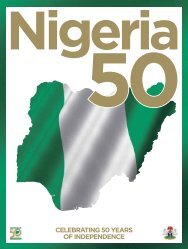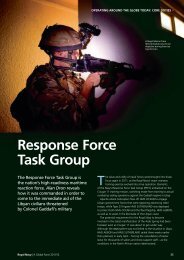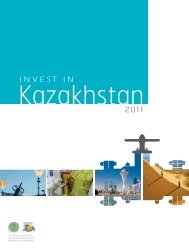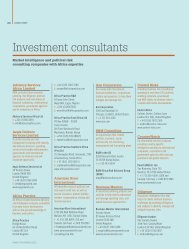NIGERIA Invest in 2012-13 - Newsdesk Media
NIGERIA Invest in 2012-13 - Newsdesk Media
NIGERIA Invest in 2012-13 - Newsdesk Media
Create successful ePaper yourself
Turn your PDF publications into a flip-book with our unique Google optimized e-Paper software.
140<br />
SOCIAL INFRASTRUCTURE<br />
the chance to take GCE ‘O’ Levels. Students who progress<br />
to higher education can study at traditional universities as<br />
well as the federal and state-owned polytechnics and<br />
colleges, which were established to tra<strong>in</strong> technical,<br />
middle-level students.<br />
Government efforts<br />
It is a system that sounds familiar to citizens of many<br />
countries. In spite of all the groundwork done by the Nigerian<br />
authorities, however, critics argue that the nation lags beh<strong>in</strong>d<br />
its competitors when it comes to education and skills<br />
development. Accord<strong>in</strong>g to figures from UNESCO’s Institute of<br />
Statistics, Nigeria’s adult literacy rate was 61 per cent <strong>in</strong><br />
2009. For females aged<br />
15-24, it was 65 per cent,<br />
while among males <strong>in</strong> the<br />
same age group it was 78 per<br />
cent. These figures compared<br />
favourably with its West<br />
African neighbour, Ben<strong>in</strong>,<br />
which had an adult literacy rate of 42 per cent. But it did not<br />
fare so well alongside Cameroon’s 71 per cent adult literacy<br />
rate and Ghana’s 67 per cent.<br />
Despite all of the government’s efforts, Nigeria’s<br />
educational system still has some way to go.<br />
“At the moment we do not see any improvement <strong>in</strong> the skills<br />
and education be<strong>in</strong>g provided with<strong>in</strong> the Nigerian education<br />
system,” says Phil Wharton, deputy chairman, Costa<strong>in</strong>, West<br />
Africa. “In fact, we see it decl<strong>in</strong><strong>in</strong>g, with constant disruption<br />
to education by tutor strikes and corrupt exam results.”<br />
Accord<strong>in</strong>g to Mr Wharton, most talent is found <strong>in</strong><br />
Nigerians schooled overseas. He says: “The big benefit we<br />
see is from the <strong>in</strong>creas<strong>in</strong>g number of Nigerians who are<br />
Literacy rates <strong>in</strong> Nigeria<br />
Females aged 15-24 Males aged 15-24<br />
INvEST IN <strong>NIGERIA</strong> <strong>2012</strong>-<strong>13</strong><br />
65% 78%<br />
Education is vital <strong>in</strong> the<br />
alleviation of poverty<br />
educated or tra<strong>in</strong>ed abroad who are br<strong>in</strong>g<strong>in</strong>g their skills back<br />
here; they see opportunities with<strong>in</strong> Nigeria and pay levels that<br />
are <strong>in</strong>creas<strong>in</strong>gly on a par with other countries. As a bus<strong>in</strong>ess,<br />
we have gradually replaced nearly all our expatriate staff<br />
with repatriated Nigerians who understand the culture<br />
better, enabl<strong>in</strong>g us to save on employee costs.”<br />
Soni Daniel, deputy editor of Nigerian daily newspaper<br />
Leadership, agrees: “Although skills centres have sprung up <strong>in</strong><br />
many places, the products are still not good enough to support<br />
a virile economy. What most serious go<strong>in</strong>g concerns have done<br />
to bridge the skills gap is to recruit and tra<strong>in</strong> <strong>in</strong> the relevant<br />
areas the people they need for their operations.”<br />
The race is now on to improve education and skills<br />
tra<strong>in</strong><strong>in</strong>g, to ensure the<br />
country can meet grow<strong>in</strong>g<br />
demands for a high-quality<br />
workforce able to drive<br />
further economic<br />
development. Particular<br />
emphasis is be<strong>in</strong>g put on<br />
boost<strong>in</strong>g skills <strong>in</strong> areas such as oil and gas, ICT, agriculture,<br />
construction, film and multimedia.<br />
The World Bank is <strong>in</strong>volved <strong>in</strong> a range of educational and<br />
related projects <strong>in</strong> Nigeria. These <strong>in</strong>clude a number of state<br />
schemes managed by the organisation’s education team. For<br />
example, the $65 million State Education Sector Project<br />
(SESP) aims to improve basic education, while the target of<br />
the $95 million Lagos Secondary Education Project is to<br />
upgrade all public schools <strong>in</strong> the state. There are also federal<br />
schemes, such as the $180 million Science and Technology<br />
Education Post-Basic (STEP-B) project, which aims to produce<br />
more and better-qualified science and technology graduates.<br />
Dr Olatunde Adekola, senior education specialist,<br />
World Bank Country Office, Abuja, says: “Another project<br />
be<strong>in</strong>g prepared is the $150 million State Education<br />
Programmatic <strong>Invest</strong>ment Project <strong>in</strong> the states of Ekiti,<br />
Bauchi and Anambra. Edo may also be <strong>in</strong>cluded.”<br />
He adds: “Efforts are be<strong>in</strong>g <strong>in</strong>tensified to reform<br />
exam<strong>in</strong>ation system policies and to boost the <strong>in</strong>centives for<br />
school-based activities to improve the quality of education.”<br />
Improv<strong>in</strong>g quality <strong>in</strong> higher education<br />
In higher education there are efforts to improve quality. The<br />
government, through the National Universities Commission,<br />
aims to improve regulation of the university education system.<br />
At the heart of these efforts is a push for proper accreditation<br />
of courses <strong>in</strong> various universities, especially private ones.







